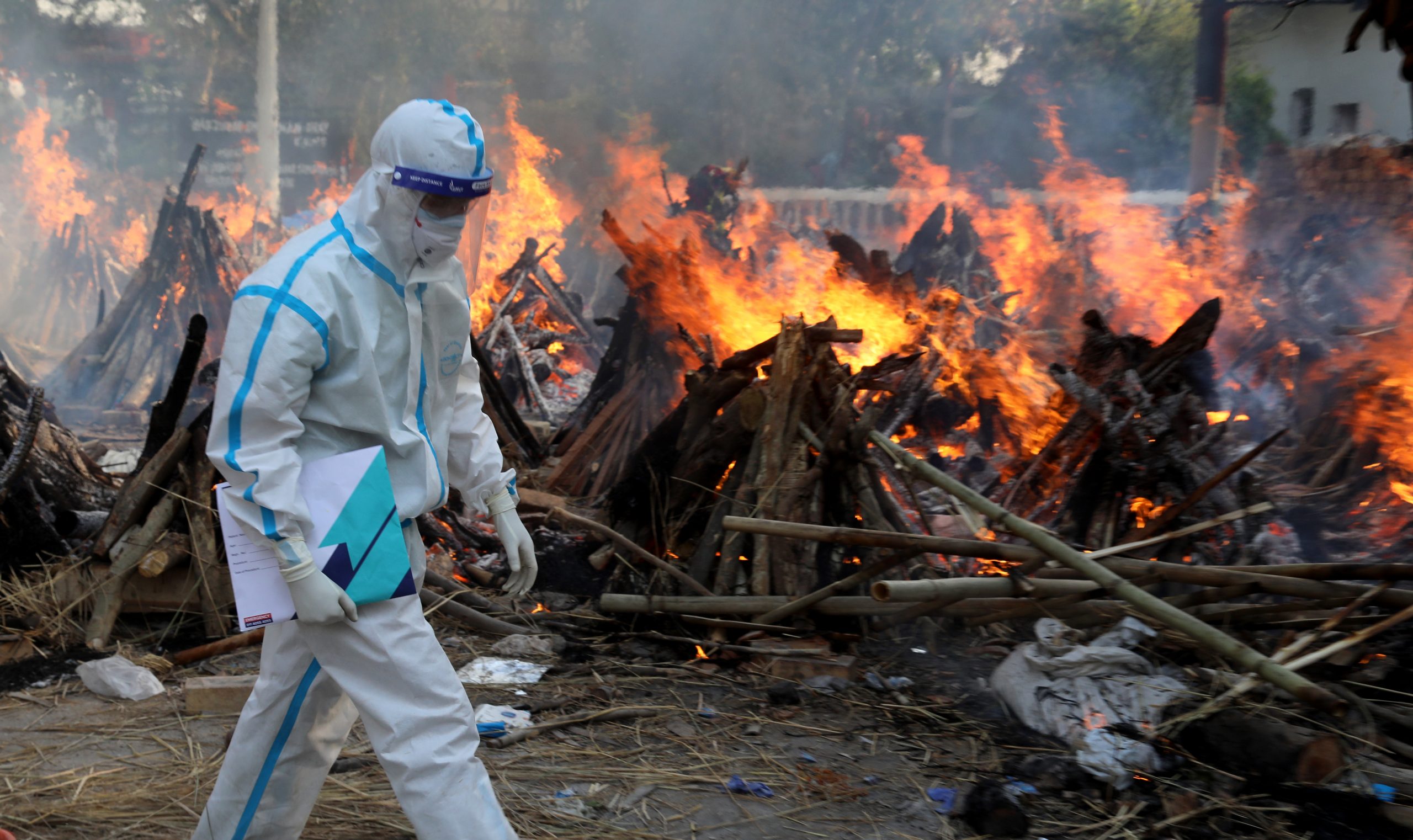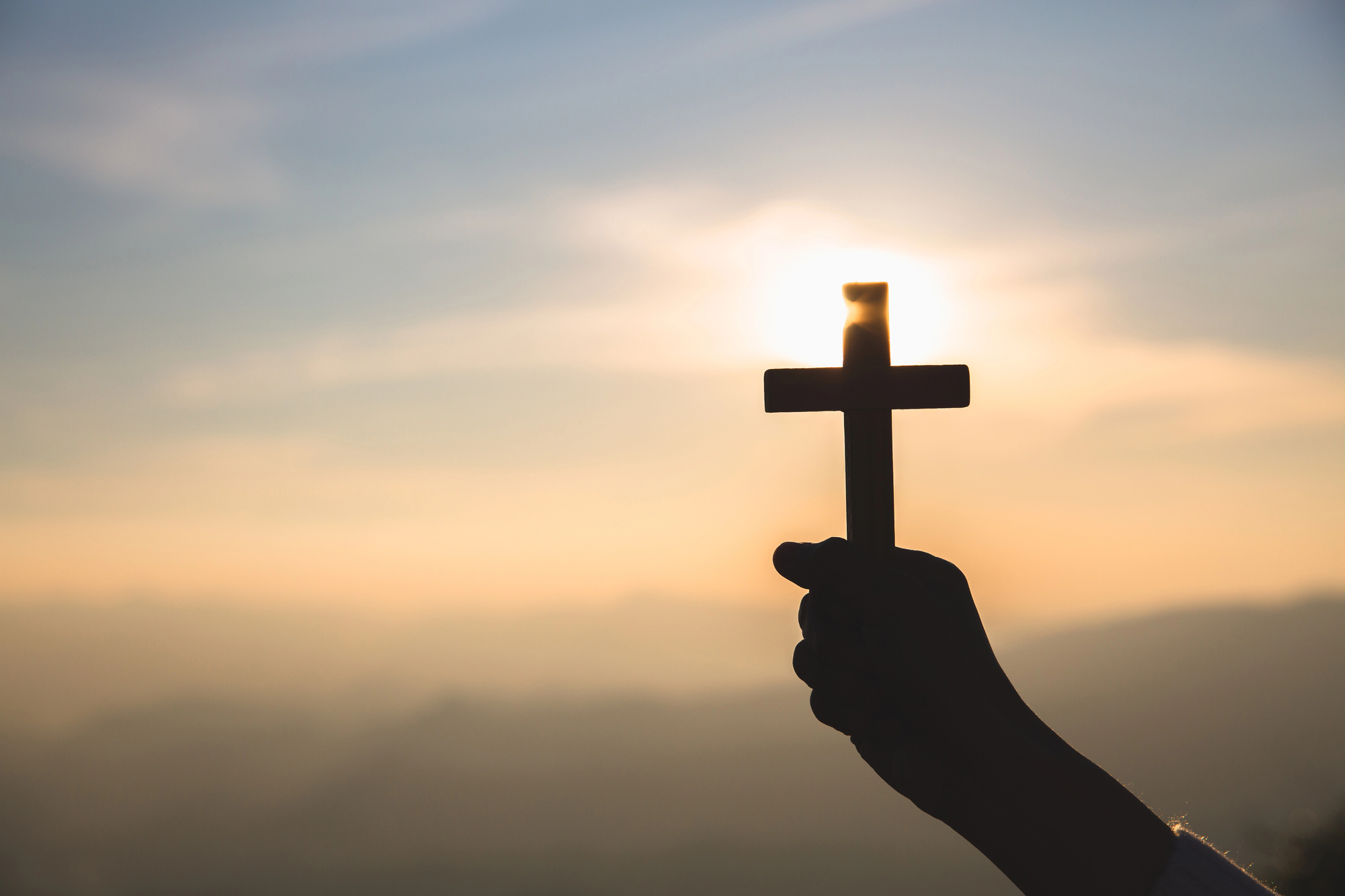Where is God in this pandemic? A pastor from India responds
As India reels from tragedy after tragedy, how can the body of Christ rise up? This is the fourth of a 5-part special report on India's Covid-19 crisis.
Rev Christopher David // June 5, 2021, 12:50 am

A man dressed in full PPE passing a mass cremation of Covid-19 victims in New Delhi, India, on April 30, 2021. Photo by Exposure Visuals/ Shutterstock.com.
It is painful for us to read the news of how the pandemic in India has thrown millions of people into grief, poverty and suffering.
But it is another thing to personally watch it unfold and engulf your own nation in devastation.
Rev Christopher P David, who lives in Chennai, has witnessed his country and people crumble under a crushing weight this past year. There are no easy answers as to where God is in the pandemic, he tells Salt&Light.
But turning to the pages of the Bible, the Presbyterian minister shares how we can cling to the knowledge of a good and loving God even when we stare into the face of pain and suffering.
India currently resembles a scene from a zombie apocalypse movie.
Funeral pyres burn day and night, bodies are buried on riverbanks, and hospital beds are filled with patients gasping for oxygen.
India currently resembles a scene from a zombie apocalypse movie.
The virus ravages India with ferocity.
Nearly everyone in India has lost a family member or friend. Every day for the last three weeks, someone I have personally known has died. It is a land of decay and death.
The vibrant India that is usually full of life is under lockdown. In quiet mourning.
A sense of helplessness prevails. Fear, anger, guilt, sadness and a cocktail of other potent emotions swirl around in the atmosphere.
Amid all this misery, the question resounds everywhere: “Where is God in this pandemic?”
No simple answers
We ask questions because we seek answers. We hope there are answers to quell our doubts and comfort our weary souls. We pray for answers to help us make sense of this pandemic and the suffering it has inflicted.
Life is too complex for naïve easy answers. Such answers trivialise the experience of suffering.
God knows our heart’s yearnings and he answers them.
However, God does not give us easy, simplistic answers to distract us as one might do by giving chocolate to a crying child.
Life is too complex for naïve easy answers. Such answers trivialise the experience of suffering. That is how Job’s callous friends responded.
But God does not insult our intelligence or ignore our experiences of pain with trite responses.
And neither should we settle for such answers.
The presence of pandemics
Pandemics are not new to humanity and neither is sickness and death.
Nevertheless, we are always surprised and shocked by the devastation. This is rightly so for such things are not natural to this world. God never intended the world to suffer from viruses and people to die gasping for breath.
When God created the world, he saw all that he had made, and it was very good (Genesis 1:31). There were no vagrant viruses in Eden.
We all return to dust for we are all sinners who participate in high treason against a holy God.
The word “virus”, derived from Latin, originally meaning “poison” or “venom” had no place in the bliss of Eden. Pandemics thus are alien to the good world God created. It is an evil that has invaded this world and marred the perfect order of creation.
This raises a serious question: How do we explain the presence of this evil?
The Bible traces the answer to the fall of mankind in Adam and Eve’s rebellion against God. The Bible terms this as sin. The entrance of evil into this world is due to the sinfulness of man.
We can trace the moral evil of the Jewish holocaust or the terrorist attacks on 9/11 directly to human acts of sin. However, with natural evils such as an earthquake, a tsunami or a pandemic, it is not easy to see the direct relationship between sin and suffering.
When Adam sinned against God, he rebelled against God’s holy order. His sin in denying the rightful reign of God over his life brought forth chaos, corruption and curse upon all creation. The whole of creation has been subjected to futility and is in bondage to corruption (Romans 8:20-21).
Adam’s sin, in which we all partake, fractures all of cosmos causing death to reign in this world (Romans 5:12). God’s good design is now broken. Disease, decay and death are the norm in this fallen world.
Even if not for this current strain of the coronavirus, humanity continues to experience sickness, ageing and eventual death. We all return to dust for we are all sinners who participate in high treason against a holy God.
Sin is destructive. It is a noxious viral strain within us that works its lethal poison to all our life.
Our greed, selfishness, hatred, idolatry and moral corruption have consequences. In a world of depravity where we see men devour one another, it is no surprise to see nature, too, behave destructively.
The old Puritan theologian Ralph Venning (1621-74) described this as creation’s “witness against sin as having done it a great deal of wrong and injury.”
Sin is a monstrous sickness. All plagues and pandemics are but the subsequent ailments brought forth by the cancer of sin which afflicts all humanity.
The presence of God
The Bible is clear that the presence of sin and the presence of suffering does not translate to the absence of God.
The presence of sin and the presence of suffering does not translate to the absence of God.
The third-century Greek philosopher Epicurus, eighteenth-century Scottish enlightenment philosopher, David Hume, and twenty-first-century proponents of the new atheism postulate that the presence of a God of power, goodness and love is incompatible with the sufferings in the world.
The Bible states the very opposite. God, who is powerful and benevolent, is sovereign even over sickness and sufferings, and He uses it for His good purposes.
The ten plagues upon Egypt (Exodus 15:26), the plague upon the Israelites at Shittim when they indulged in sexual immorality with Moabite women (Numbers 25:8-9), the plague upon the Philistines when they captured the Ark of the Covenant (1 Samuel 5:6-7), the pestilence upon Israel due to King David’s sinful census (1 Chronicles 21:14), the plague against Judah due to the wickedness and idolatry in the reign of King Jehoram (2 Chronicles 21:14), among numerous other plagues, are all under God’s control.
God has absolute sway over life and death. This means that whatever the situation – even if death itself – God is not absent.
Bishop JC Ryle, in a sermon during the Cattle Plague of 1865-67 in England, said: “He who made the world at the beginning by the finger of creating wisdom – will never cease to govern the world by the finger of His providence.”
God has absolute sway over life and death. Moses, the man of God confesses this truth saying: “You return man to dust and say, “Return, O children of man!” (Psalm 90:3). All our times are in God’s hands (Psalm 31:15) and if it is the Lord’s will, we will live (James 4:15).
This means that whatever the situation – even in death itself – God is not absent. Rather such situations awaken us and call us to greater awareness of God’s presence in our midst. God is there. We only need to have eyes of faith to see this.
CS Lewis said pain is God’s “megaphone to rouse a deaf world” to repentance. This crisis is an opportunity for us to introspect the frailty of human life, the vanity of the world, and the emptiness of the idols we have erected.
This pandemic is a call to turn to God who is always there!
The place of prayer
In moments of extreme loss, it can seem like God has abandoned us.
These cries of the heart do not come from unbelief. This is the Biblical language of lament.
The book of Psalms is full of such feelings of forsakenness and godlessness by the saints of God. Consider the following Psalms that voice the visceral anguish of the believer:
How long, O LORD? Will you forget me forever? How long will you hide your face from me? (Psalm 13:1)
Why do you hide your face? Why do you forget our affliction and oppression? (Psalm 44:24)
How long, Lord? Will You hide Yourself forever? Will Your wrath burn like fire? (Psalm 89:46)
These cries of the heart do not come from unbelief. This is the Biblical language of lament where God beckons us to boldly come to him with our tears, aches and complaints.
This is the place for prayer in a pandemic. We have a God who is not only willing to see our tears and hear our complaints but also one who sympathises with us and comforts us (Hebrews 4:15; Romans 8:26).
Prayer is the meeting place where God communes with us. It is where the realms of holy heaven intersect this fallen world of woe.
In this place of meeting between both worlds, we live by faith knowing that, though circumstances are dire in this world, God is in control and that He loves us.
The answer of the cross
On the cross of Calvary, we see the answer to all our doubts and questions. It is not a philosophical answer but a personal answer in the God-man Jesus who lay suspended between heaven and earth.
This pandemic is a window into eternity. It causes us to recoil at sin and throw ourselves upon the grace of God in Christ Jesus.
Jesus suffered unspeakable anguish which our minds dare not even begin to imagine.
American philosopher-theologian, Nicholas Wolterstorff, following the death of his 25-year-old son in a mountaineering accident wrote:
How is faith to endure, O God, when you allow all this scraping and tearing on us? You have allowed rivers of blood to flow, mountains of suffering to pile up, sobs to become humanity’s song – all without lifting a finger that we could see. You have allowed bonds of love beyond number to be painfully snapped. If you have not abandoned us, explain yourself. We strain to hear. But instead of hearing an answer we catch sight of God himself scraped and torn. Through our tears we see the tears of God.
Christ suffered the ravages of sin for our sake. He did not merely feel abandoned as we do, but was actually abandoned by his heavenly Father.
Till that glorious day when this fallen world would be made new without pandemics, the love of God sustains us.
In coming to the foot of the cross, we see God in the midst of us, suffering for us and ultimately dying for us so that one day we may never suffer or die. We see love so strong it conquers death.
This pandemic is a window into eternity. It causes us to recoil at sin and throw ourselves upon the grace of God in Christ Jesus.
In doing this we live with hope as Paul said “I consider that the sufferings of this present time are not worth comparing with the glory that is to be revealed to us.” (Romans 8:18)
One day there will be no more disease, no more pain, no more tears and no more death.
A friend who lost a family member to the pandemic recently told me: “I don’t know where God is in all this. But I believe he is out there somewhere and that he loves me.”
Till that glorious day when this fallen world would be made new without pandemics, the love of God sustains us.
For I am sure that neither death nor life, nor angels nor rulers, nor things present nor things to come, nor powers, nor height nor depth, nor anything else in all creation, will be able to separate us from the love of God in Christ Jesus our Lord (Romans 8:38-39).
MORE FROM OUR SPECIAL REPORT ON INDIA’S COVID CRISIS:
Church in India in crisis as deaths from Covid-19 leave leadership vacuum
We are an independent, non-profit organisation that relies on the generosity of our readers, such as yourself, to continue serving the kingdom. Every dollar donated goes directly back into our editorial coverage.
Would you consider partnering with us in our kingdom work by supporting us financially, either as a one-off donation, or a recurring pledge?
Support Salt&Light



